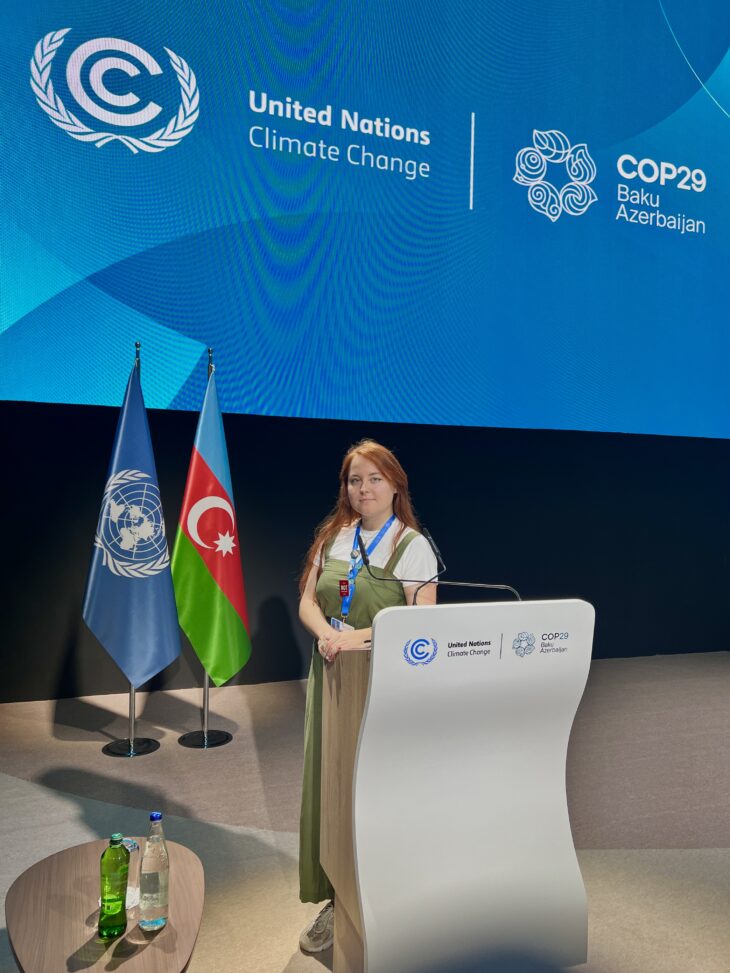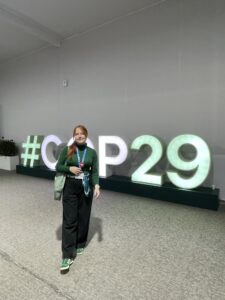
What happened in Baku
The year 2023, officially recognized as the hottest on record, set the stage for COP29 in Baku, Azerbaijan. Against this stark backdrop, the 29th UN Climate Conference became a critical platform for addressing the escalating climate crisis.
As the world’s attention turned to Baku, the conference centered on key topics: the need for rapid decarbonization, climate finance mechanisms, and the role of fossil fuels. However, much like in previous years, discussions were mired in debates over whether to phase out or phase down fossil fuels — the very drivers of the crisis.

I have attended COPs since 2022, being an Alumni of XAMK’s Environmental Engineering program and also a specialist in climate education. This year, I was following some topics closer such as gender equality and just transition, as they will be setting up the scene for educational contexts too.
COP29 Outcomes
The UN Climate Conference (COP29) brings together nearly 200 countries annually to drive systemic change. This year marked notable developments such as the establishment of a new funding target, the launch of carbon markets, and heightened climate ambition. However, every comma in official texts represents a battleground, as the specific language determines the real-world impact of these solutions.
The Elephant in the Room: Fossil Fuels
Despite global expectations, countries did not introduce new commitments to transition away from fossil fuels in a “fair and orderly manner.” The phrase, diluted from last year’s discussions, reflects the influence of oil giants. While transition fuels were emphasized, the ambition to accelerate the shift to clean energy remains weak.
So What? The oil lobby continues to dominate, leaving the fight for clean energy in the hands of determined individuals and collectives. Progress will depend on collective participation to turn this into a reality.
Finance
Countries committed to increasing climate finance for developing nations to $300 billion annually by 2035. Additionally, $1.3 trillion per year was pledged for public and private mobilization. However, inflation has eroded the value of these commitments, with developing countries labeling the targets as inadequate.
So What? While this new target is a step forward, mechanisms for fund distribution—whether grants or loans—remain unclear, leaving significant skepticism around implementation.
Carbon Markets: Paris Agreement goes fully operational
Countries will officially trade carbon credits, equivalent to one ton of CO2 reduced or not emitted. For instance, high-emitting nations can purchase credits from countries restoring forests or introducing renewable energy.
So What? Supporters believe this will enable faster, cost-effective progress while generating funds for green projects in developing countries. However, critics warn of greenwashing risks, underscoring the need for strict oversight to ensure genuine impact.
There is progress!
COP29 demonstrated advancements in transparency and inclusion:
- Transparent Reporting: Countries are now required to report their climate progress every two years.
- Gender and Inclusion: The Lima Gender Agenda was extended for 10 years, recognizing the role of youth and people with disabilities in climate action.
Rising Temperatures, dwindling trust
Global emissions continue to rise, with forecasts pointing toward a 3°C increase by 2100—far beyond the 1.5°C goal. Although current projections have improved from pre-Paris trajectories (4°C warming), the pace of change is insufficient to meet the critical target.
What can you do
Action begins at home. Individuals can contribute by:
- Reducing consumption
- Voting for green initiatives
- Supporting local sustainability projects
It’s not necessary to attend COP conferences; the foundation of change lies in everyday efforts. Remember, system-level change requires participation at every level—from grassroots to global.
What’s Next
Will countries step up their ambition by 2025, and more importantly, deliver on their promises? The future of climate action will depend on how these commitments are implemented and who ensures their fulfillment.
Stay tuned for the next developments, and see you at COP30 in Belém!
As a representative of Xamk and a passionate advocate for sustainability, I am committed to integrating the lessons of COP29 into my work and sharing these insights with my university and beyond. If you’re interested in collaborating on climate projects or discussing these topics further, feel free to reach out!

- 5 great opportunities to apply now and enjoy in 2025 - 13th December 2024
- 10 Must-Have AI Tools for Students to Make Studying Easier - 5th December 2024
- What happened in Baku - 29th November 2024
